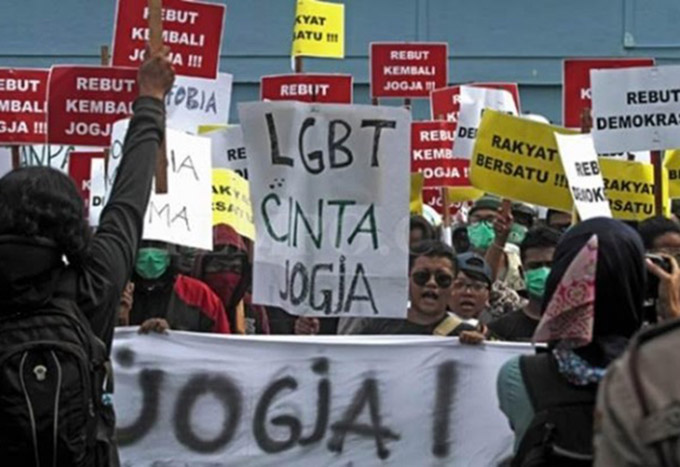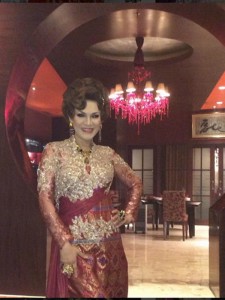
Indonesia is experiencing an unprecedented wave of anti-LGBT sentiment.
If there was a single event that has incited the current wave of violence against lesbian, gay, bisexual and transgender (LGBT) people in Indonesia we might settle upon a minister’s affront at LGBT becoming visible in solidarity.
Having been advised of a university-based LGBT support group, Indonesia’s Technology, Research and Higher Education Minister Muhammad Nasir publicly stated in January 2016 that universities must uphold standards of “values and morals” and therefore should not support organisations that promote LGBT activities.
Nasir’s supposed evidence was the existence of the Support Group and Resource Center on Sexuality Studies (SGRC) based at the University of Indonesia—it missed Nasir’s attention that SGRC was not an LGBT organisation and that the LGBT Peer Support group under its auspice was not trying to convert people but provide information to students on such things as sexual health.
The ensuing backlash against the minister’s statement resulted in Nasir stressing that he was not against LGBT and, indeed, that LGBT had the right to join organisations, like every Indonesian citizen.
Nasir further noted, “We are not against LGBTs but the activity … [T]he problem is when they are showing romance, kissing, and making love (in public).”
In other words, Nasir was not concerned about LGBT per se, but rather felt threatened by moves perceived to increase LGBT collective visibility. Similarly, the Speaker of the People’s Consultative Assembly and Chair of the National Mandate Party, Zulkifli Hasan, commented, “As a movement, the existence of LGBT must be opposed. We must limit its room to move. However, as individual people, they must be protected like any other citizen.”
At issue is fear of LGBT being visible in solidarity and, as anthropologist Tom Boellstorff notes, national belonging.

Sanctuary with invisibility
Invisibility has provided many LGBT people in Indonesia with some sanctuary. Invisibility has been achieved by marrying heterosexually, ostensibly reinforcing heteronormativity and being discerning in undertaking political activities.
A few individuals have been staunchly visible and transwomen such as television personality Dorce Gamalama are known by many—indeed, President Joko Widodo has appeared alongside Dorce at public events.
By and large, tolerance, and at times acceptance, has been accorded to LGBT in Indonesia through the community keeping an often reserved profile and through strategic political engagement. Considering this value of invisibility, the event that precipitated the current wave of aggression was unsurprisingly one perceived as an effort to increase a collective profile of LGBT Indonesians.
While homosexuality has never been illegal in Indonesia, persecution of LGBT is not new. Police and extremist Islamist groups, such as the Islamic Defenders Front, have previously targeted LGBT.
In 2013, the Pew Research Centre reported that 93 percent of Indonesians thought homosexuality should not be accepted in Indonesia—a higher percentage than any other Asia-Pacific country surveyed and worryingly close to Nigeria’s score of 98 percent.
We can’t take this figure as reliable though—only 1000 people were surveyed and the framing of the question was loaded towards getting a homophobic response.
While Indonesia is far more accommodating of LGBT than such a figure suggests, homophobia is not new to Indonesia. However, the swiftness and duration of this wave of anti-LGBT sentiment is unprecedented.
Nasir’s comment that universities should not support LGBT activities was reported in inflammatory headlines such as “LGBT not welcome at university”.
Media frenzy
National and international media went into a frenzy, quickly presenting the issue as LGBT being banned from attending university in Indonesia. Buoyed perhaps by the belief that their homophobic sentiments might suddenly get traction and win them support, conservative political ministers and religious leaders weighed in on the debate.
The debate became framed in increasingly polarised and violent terms. In the two months that followed Nasir’s outburst, numerous incendiary statements were issued and actions taken.
Republika, a conservative Islamic publication, ran the headline “LGBT poses serious threat to nation.”
Nahdlatul Ulama, the largest Muslim organisation in Indonesia with possibly 40 million members, stated that non-heterosexual orientation is incompatible with human nature and that LGBT activities must be prohibited by law.
Berliana Kartakusumah, secretary-general of the People’s Conscience Party, claimed: “Being LGBT is an infectious and dangerous disease. LGBT must be banned, like we banned communism and drug trafficking.”
Former communications minister Tifatul Sembiring effectively exhorted his one million Twitter followers to kill any gay people they find.
Direct threat
LGBT were presented as directly threatening Indonesia, with the chair of the commission of the House of Representatives, and the person in charge of defence, foreign affairs, communications, information and intelligence, Mahfudz Siddiq, stating, “LGBT issues can damage national security, identity, culture and the faith of Indonesians.”
Defence Minister Ryamizard Ryacudu described efforts to recognise LGBT rights as an attempt by western nations to undermine Indonesia’s sovereignty and he called the LGBT movement a “proxy war” aimed at brainwashing Indonesians.
Indonesia’s vice-president Jusuf Kalla explicitly rejected UN funding that would support work on ending stigma, discrimination and violence towards LGBT people.
The Indonesian Psychiatrists Association (PDSKJI) classified homosexuality, bisexuality and transgenderism as mental disorders and issued a statement noting, “We need to promote, prevent, cure and rehabilitate LGBT people.”
PDSKJI member Suzy Yusna Dewi commented that “We really do care about them. What we are worried about is, if left untreated, such sexual tendencies could become a commonly accepted condition in society.”
Following the World Health Organisation’s 1990 lead, Indonesia declassified homosexuality as a psychiatric disorder in 1993, although gender identity disorder remained. PDSKJI’s move to now classify homosexuality as a treatable disorder drew on Indonesia’s Law No.18/2014 on Mental Health and the Mental Disorder Diagnostic Guidelines.
While neither the law nor the guidelines mention LGBT, such omission did not stop PDSKJI from using it as support for framing homosexuals and bisexuals as ‘people with psychiatric problems’ and transgender people as having ‘mental disorders.’ That the law has been prejudicially extended to support this classification of LGBT is deeply concerning.
Radio and television bans
The Indonesian Broadcasting Commission banned radio and television stations from airing any program portraying LGBT behaviour as “normal”. This move was supported by law-makers and others who claimed that such a ban would protect children and teenagers ‘susceptible to duplicating deviant LGBT behaviours’.
Efforts were made by politicians to mandate ‘rehabilitation for every person who has LGBT characteristics’ and prohibit online content viewed as promoting homosexuality.
The fear and anxiety caused by these events forced many in the LGBT community into hiding
While it was reported that the Social Affairs Minister advocated bathing LGBT in boiling water infused with spices to cure homosexuality—she actually thinks this would only work for drug addicts—she promoted spiritual training as a cure. The world’s first Islamic school for transwomen was forced to close. A number of anti-LGBT protests took place while pro-LGBT demonstrations were supressed by police.
The fear and anxiety caused by these events, all of which occurred between January and March 2016, forced many in the LGBT community into hiding. LGBT friends in Indonesia have changed their mobile phone numbers so they cannot be contacted; they have moved out of their boarding houses to undisclosed safe houses; and they have deleted social media postings and unfriended people for fear of being identified and potentially blackmailed.
Police are checking identity cards at LGBT hangouts and detaining those without ID or from out of area. Dede Oetomo, who founded the LGBT rights group GAYa NUSANTARA in 1987, has told employees to stay away from the office for fear of harassment. Forced reclusion means, among other things, that people who need sexual health care and HIV treatment are too afraid to access services.
What is behind the intensity of current unrest? I identify six key converging factors:
First, the perception that LGBT were trying to stake a collective claim on Indonesia precipitated outbursts from high-ranking government and religious leaders.
While for Nasir and others, LGBT are not troublesome individually, as a group they are. The view that LGBT were gaining visible solidarity (under university auspice) provoked homophobic rhetoric and media furore painted the issue as an “LGBT crises”. Notably, the homophobia was not sparked by demands amongst the LGBT community for right to marry or adopt children or to ban discrimination.
Communist association
The timing of the “LGBT crises” has not gone unnoticed with at least one commentator noting that that the furore came about just as revisions were to be made to the anti-corruption law. Moreover, framing LGBT as a movement (gerakan) drew on negative connotations of the term in Indonesia, with its association with communism.
Second, once the fire was stoked, the simmering issue of perceived Indonesian moral decay rose to the surface. Tight social controls under authoritarian President Suharto (1965–98) have given way to an era of reformation, synonymous for some with sexual promiscuity.
The passing of the Pornography Bill in 2008 is one reaction to fears of sexual deviance. The current anti-LGBT movement is an extension of this fear.
Third, increasing religiosity in Indonesia is providing ammunition and support for anti-LGBT rhetoric. While religious freedom is felicitous (e.g. the 2013 revoking of a law prohibiting policewomen from wearing the veil at work), the use of Islam to justify killing LGBT, and the support that such messages are receiving, is deeply concerning.
Fourth, antagonistic relations between Indonesia and the West (primarily Australia in the aftermath of spying allegations and Indonesia’s execution of two Australian prisoners) have fuelled anti-LGBT sentiment. LGBT are framed as a western import threatening Indonesia’s sovereignty and security, a dangerous and erroneous message embraced in many parts of Indonesia.
Fifth, economic disenfranchisement among a younger generation has produced a class of men and women with little outlet for their anger. An easy target for the frustrations of neoconservative youth is the LGBT community.
Sixth, Indonesia’s embrace of social media fostered swift and widespread public engagement in the disputation. Twitter hashtags such as #TolakLGBT (RejectLGBT) quickly trended and reactions to the banning of LGBT emojis provoked comment from across the nation, propelling the debate with extraordinary fervour.
Is there hope for an Indonesia that tolerates, accepts and celebrates its LGBT community? I think so, for three key reasons. First, while much of the LGBT persecution has stemmed from a religious base, the vast majority of Indonesians follow an Islam that is accepting and accommodating of diversity.
Second, even ministers who abhor the LGBT community condemn violence and state that LGBT are part of Indonesia. And third, amidst all the malicious rhetoric and violence, the debate is making LGBT visible in a way not previously possible. There is a community of LGBT and their supporters, both in Indonesia and across the world, and while the community is discrete it is one hard to subdue.
Thanks to Dede Oetomo, Tom Boellstorff, Saskia Wieringa, Nurshabani Katjasungkana and Ben Murtagh for helpful comments and suggestions.












































